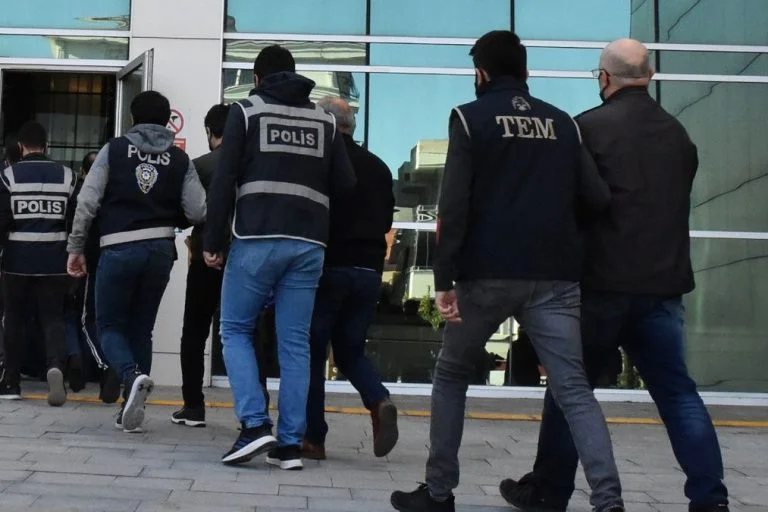Turkish authorities detained 52 people, including politicians, journalists and artists, in early morning raids across 10 provinces on Tuesday as part of an investigation into the Peoples’ Democratic Congress (HDK), an umbrella organization for left-wing and pro-Kurdish groups, Turkish media reported.
The operation was part of an investigation led by the İstanbul Chief Public Prosecutor’s Office. Authorities issued detention warrants for 60 individuals, with police raiding homes and offices in simultaneous dawn operations.
Among those detained were pro-Kurdish Peoples’ Equality and Democracy Party (DEM Party) Central Executive Committee (MYK) members Semiha Şahin and Mehmet Saltoğlu; Labor Party (EMEP) İstanbul Provincial Chair Sema Barbaros; journalists Yıldız Tar, Elif Akgül and Ercüment Akdeniz; and singer Pınar Aydınlar. The detainees also included members of various socialist and left-wing organizations, such as the Green Left Party and the Socialist Refoundation Party (SYKP).
The prosecutor’s office described the HDK as a “legal front organization” operating as an “alternative assembly” to the Turkish parliament and alleged that it follows directives from the outlawed Kurdistan Workers’ Party (PKK) and the Kurdistan Communities Union (KCK). Authorities cited a 2019 ruling by Turkey’s Supreme Court of Appeals that labeled the Democratic Society Congress (DTK), an entity closely linked to the HDK, as a terrorist organization.
Officials claimed that HDK members played a role in past unrest, including the 2014 Kobani protests and the 2015 urban clashes in southeastern Turkey following the collapse of Ankara’s peace talks with the PKK, and alleged that some within the organization facilitated recruitment efforts for PKK-linked militant groups.
Detentions come amid renewed discussion of peace
The operation took place amid renewed discussions about a potential peace between the Turkish government and the PKK, with jailed PKK leader Abdullah Öcalan reportedly working on a new roadmap to end the decades-long conflict.
A delegation from the DEM Party recently visited Öcalan twice at İmralı Prison before traveling to Iraq’s Kurdistan region to hold talks with local Kurdish leaders, including Kurdistan Regional Government (KRG) President Nechirvan Barzani and influential Kurdish leader Masoud Barzani.
“Mr. Öcalan is working to find a process that could lead to a solution despite all the difficult conditions,” Democratic Regions Party (DBP) official Keskin Bayındır said after a meeting in Arbil. He added that Öcalan’s proposed roadmap aims to shift the Kurdish issue from the battlefield to a “democratic and legal process.”
President Recep Tayyip Erdoğan, who spearheaded past peace negotiations with Öcalan before talks collapsed in 2015, recently referred to the current moment as a “historic window of opportunity.” However, the latest wave of detentions and the government’s continued appointment of state trustees to replace pro-Kurdish mayors have raised doubts about the government’s sincerity in seeking a resolution.
Opposition parties condemn detentions
The DEM Party, the main pro-Kurdish political party in Turkey, condemned the operation, calling it an “assault on democracy and peace efforts.”
“It is clear that the possibility of peace is unsettling some. Every day, those calling for a democratic resolution to the Kurdish issue are targeted. Every day, the people’s will is overridden by government-appointed trustees,” the party said in a statement.
DEM Party Co-Chair Tülay Hatimoğulları vowed to resist what she described as increasing repression.
“We have not and will not surrender to this mentality that detains politicians, journalists and artists while silencing civil opposition,” Hatimoğulları said.
EMEP Chairman Seyit Aslan also denounced the detentions, stating, “The government seeks to turn Turkey into an open-air prison. This arbitrary and unlawful operation must stop.”
The Media and Law Studies Association (MLSA), which advocates for press freedom in Turkey, confirmed the detentions of journalists Yıldız Tar and Elif Akgül and condemned restrictions placed on lawyers’ access to detainees.
Meanwhile, the Green Left Party said its MYK member Naci Sönmez was among those taken into custody, arguing that the operation was part of a broader attempt to dismantle legal democratic opposition in Turkey.
EMEP İstanbul MP İskender Bayhan warned that the detentions could be part of a broader crackdown. “We have learned that an investigation covering around 6,000 people is underway, with 1,600 of them residing in İstanbul,” Bayhan was quoted by the Gazete Duvar news website as saying.
The wave of detentions targeting HDK members comes just days after the Turkish government removed DEM Party member Abdullah Zeydan, mayor of the predominantly Kurdish city of Van, from office, replacing him with a state-appointed trustee. Police took over city hall and detained 127 DEM Party supporters protesting the decision.
The European Parliament on Thursday passed a resolution condemning these dismissals and calling for sanctions, including asset freezes and travel bans, on Turkish officials responsible for removing opposition mayors and undermining local democracy.
Lawmakers in Strasbourg described the trustee appointments as a clear violation of democratic principles and urged judicial reforms to abolish the practice.
Since a coup attempt in 2016, more than 100 municipalities — predominantly those governed by pro-Kurdish parties — have been placed under trustee control, with critics arguing that the government is using terrorism-related charges as a pretext to suppress political opposition. The European Union is facing growing pressure to take diplomatic and economic measures against Turkish authorities to uphold democratic norms and protect electoral integrity.
The repeated appointment of trustees in Kurdish-majority regions has also drawn criticism from human rights organizations, which argue that it undermines democracy and disenfranchises Kurdish voters.



